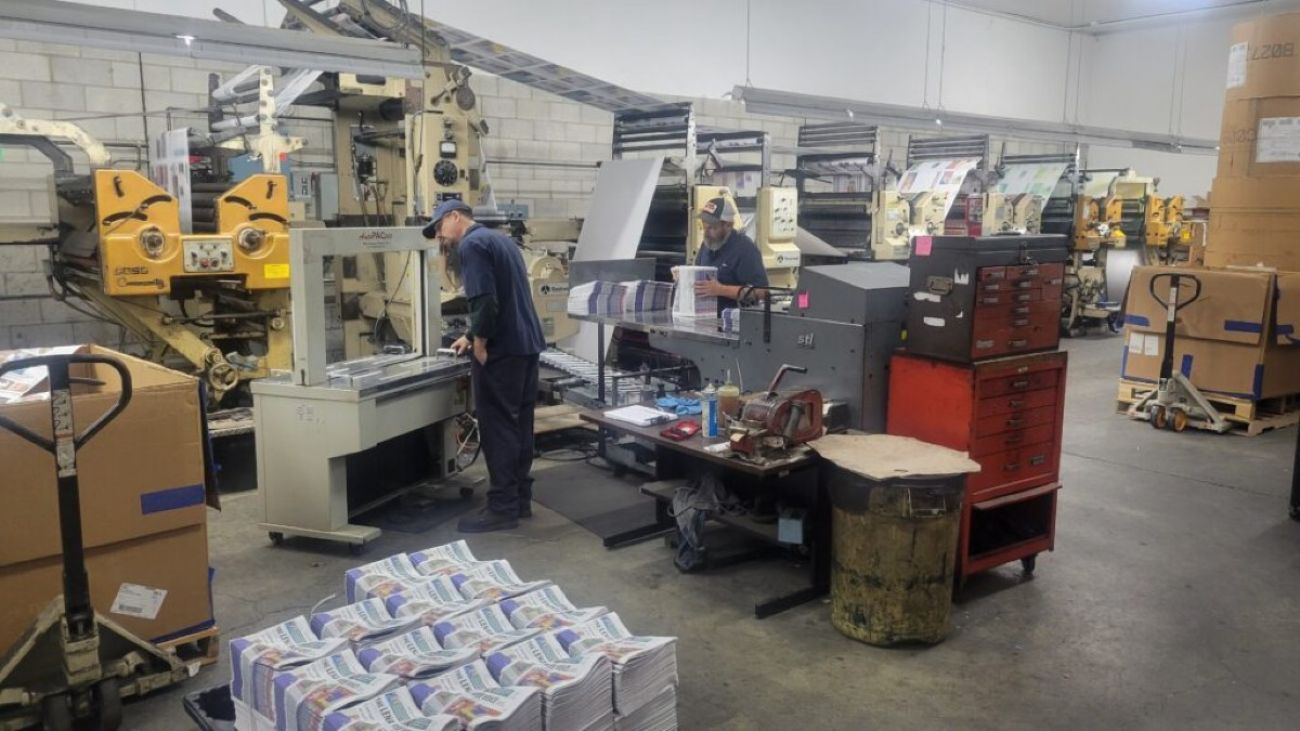As news deserts spread in Michigan, Lenawee County an unexpected oasis

- Michigan has lost 42% of its newspapers in 20 years, while so-called news deserts spread
- The trend is reversing in Lenawee County, where papers are being saved or launched
- The situation is ‘exceedingly rare’ across the nation, one expert says
After a year of meetings about the sad state of local media in Lenawee County, Deborah Comstock decided she wanted to start a newspaper.
So she sought advice from Dave Green, who retired in 2020 and shuttered his Morenci weekly newspaper in the county.
“Don’t do it,” he told her.
She didn’t listen.
In November 2023, Comstock launched the monthly Lenawee Voice, which now serves more than 20,000 people in and around Adrian. Earlier this year, Comstock launched yet another publication, the monthly Morenci Advocate, to help fill the void left by Green’s closed paper.
As newsrooms shrink around the state and country, Comstock and others in the rural southeast Michigan county — population 97,520 — have kept the media ecosystem there booming.
First came Barbara Ireland, the retiree who in 2018 moved back to Lenawee County to purchase her hometown paper, the Hudson Post-Gazette, to keep it from closing. Then came Comstock and the Voice. In December, Lenawee County businessman Rex Crist bought the Advance, a weekly based in Blissfield. Earlier this year, he also bought two other weeklies, the Tecumseh Herald and the Clinton Local. In April came the Advocate.
Add in the Daily Telegram, a 133-year-old daily newspaper, and Lenawee County now has just as many newspapers as neighboring Washtenaw County, whose population is nearly four times as large.
“Local news is the name of the game and people want to know what’s going on in their community,” said Doug Donnelly, who was hired by Crist to serve as editor and publisher of the Advance.
“They want that hometown feel, and that’s not something that a national media outlet can bring, but it’s alive and well in Lenawee County.”
Do you live in a news desert?
Michigan has lost 42% of its newspapers in the past 20 years and 65% of its newspaper jobs between 2013 and 2023, according to the Local News Initiative. Both declines are among the largest in the nation.
A news desert is defined as a community that is unserved by daily or weekly newspapers or news sites. Check to see if your community is on the list with this interactive tool.
RELATED:
- Michigan town adjusts to life with ‘ghost newsroom,’ as local papers wither
- Michigan cord-cutting accelerates, as cable TV subscriptions fall 15%
- Michigan rural libraries brace for hit from Trump order targeting spending
Such a situation is “exceedingly rare,” said Tim Franklin, senior associate dean and director of the Local News Initiative at Northwestern University in Illinois.
Over the last five years, Franklin’s group has tracked 258 local news startups around the country. Last year was the first year digital-only startups outpaced newspaper closures — too soon to call it a trend, Franklin said.
Franklin’s group could find just a handful of examples of papers selling right before closure or soon after they’d closed. Most newspaper transactions the group has tracked involve corporations buying up small papers and consolidating operations, not individuals buying papers to save them.
Michigan has lost 42% of its newspapers in the last 20 years, the 15th-largest percentage decline in the nation, Franklin said. The state lost 65% of its newspaper jobs between 2013 and 2023, America’s seventh-largest percentage loss.
That makes what’s happening in Lenawee County “unusual and welcome,” Franklin said.
“Local news organizations are kind of the glue that binds a community together,” he said. “They’re the place where a community sees itself. You can’t put a number on that, but I think it’s a real thing and I think it’s significant.”
It all started in 2023, when local farmer Comstock and her friend, psychologist and retired Adrian College professor Judith Hammerle, started meeting to discuss the shrinking local news coverage in Adrian, Lenawee County’s county seat.
Eventually, about 15 people met regularly at the local library to talk.
They’d read about so-called news deserts, areas that are no longer served by news outlets because of consolidation or closures.
“We were thinking that’s happening here, too,” Hammerle said. “And then Deborah — who’s just a ball of fire — said we need to do something about this. It was an idea she just wanted to run with.”
Comstock said her parents came to Adrian when they bought a 69-acre farm “with nothing.” The family worked their way up to “an impressive little farm” with 100 head of cattle.
“Risk-taking was sort of second-nature to me,” she said.
Comstock said she built the Voice and now the Morenci paper based on what residents told her they wanted to see in a paper, including accessible obituaries, police blotters and a firm dedication to hyper-local news.
“People say newspapers are dying because newspapers are not meeting the needs of what people want,” she said.
“Our philosophy from the beginning has been to go where we see a need,” said Erik Gable, who attended those early meetings and now serves as content director for the Voice. “We go where it seems like a need in the community isn’t being met. In many ways, a monthly cannot truly replace a daily paper, but we do what we can.”
In early December, a front-page story in the Advance in Blissfield announced the retirement of longtime owner/publisher/editor Marcia Loader and the pending closure of the paper that had served its readers for more than 150 years.
Then Crist, the owner of a chain of local convenience stores, walked in the door, checkbook in hand.
Crist, who could not be reached for comment, has added staff to the newsrooms at his new papers and is working to bolster circulation, said Jim Lincoln, who sold the Tecumseh Herald to Crist and still helps out at the paper.
“He felt that the communities cannot lose their newspapers,” Lincoln said of Crist. “I liked that point of view, obviously. I’m in my 60s and I saw an opportunity to head off for retirement but in the same way hand the paper off to somebody who had a good mindset about what community papers are all about.”
Loader, who sold the Advance to Crist, could not be reached for comment on this story.
Donnelly, the Advance publisher/editor, said the paper never missed an issue in the transition, which he credited to everyone who works for the paper and to its readers and advertisers.
“It would have been easy to close the doors like a lot of newspapers around the country have,” Donnelly said. “I think it’s just a credit to a lot of good journalists, a lot of good hometown news people, and the community that supports them and the advertisers that support them.”
See what new members are saying about why they donated to Bridge Michigan:
- “In order for this information to be accurate and unbiased it must be underwritten by its readers, not by special interests.” - Larry S.
- “Not many other media sources report on the topics Bridge does.” - Susan B.
- “Your journalism is outstanding and rare these days.” - Mark S.
If you want to ensure the future of nonpartisan, nonprofit Michigan journalism, please become a member today. You, too, will be asked why you donated and maybe we'll feature your quote next time!




